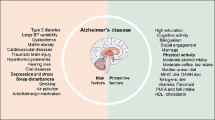Abstract
Dementia is a progressive disorder characterized by changes in behaviour, executive function, language, memory, personality and reasoning. Current therapeutic options [acetylcholinesterase (AChE) inhibitors and memantine] are unable to slow or reverse disease progression, and the cognitive function and behavioural, functional and global benefits they provide are small. Moreover, AChE inhibitors are associated with significant adverse events, including weight loss and syncope, which could be detrimental in the elderly.
Similar content being viewed by others
References
Buckley JS, Salpeter SR. A risk-benefit assessment of dementia medications: systematic review of the evidence. Drugs Aging. 2015;32(6):453–67.
Dementia: supporting people with dementia and their carers in health and social care: NICE clinical guideline 42. London: National Institute for Health and Care Excellence; 2015.
Qaseem A, Snow V, Cross JT Jr, et al. Current pharmacologic treatment of dementia: a clinical practice guideline from the American College of Physicians and the American Academy of Family Physicians. Ann Intern Med. 2008;148(5):370–8.
Prince M, Bryce R, Albanese E, et al. The global prevalence of dementia: a systematic review and metaanalysis. Alzheimers Dement. 2013;9(1):63–75 e2.
Russ TC, Morling JR. Cholinesterase inhibitors for mild cognitive impairment. Cochrane Database Syst Rev. 2012;9:CD009132.
Heilpflanzen-Welt. Ginkgo biloba leaf extract (Gingko folium): German Commission E monographs (phytotherapy). http://www.heilpflanzen-welt.de/1994-07-Ginkgo-Biloba-Leaf-Extract-Ginkgo-folium. Accessed 5 Nov 2015.
Flicker L, Grimley Evans J. Piracetam for dementia or cognitive impairment. Cochrane Database Syst Rev. 2004;(1):CD001011.
Tricco AC, Soobiah C, Berliner S, et al. Efficacy and safety of cognitive enhancers for patients with mild cognitive impairment: a systematic review and meta-analysis. CMAJ. 2013;185(16):1393–401.
Cooper C, Li R, Lyketsos C, et al. Treatment for mild cognitive impairment: systematic review. Br J Psychiatry. 2013;203(3):255–64.
Tariot PN, Cummings JL, Katz IR, et al. A randomized, double-blind, placebo-controlled study of the efficacy and safety of donepezil in patients with Alzheimer’s disease in the nursing home setting. J Am Geriatr Soc. 2001;49(12):1590–9.
Birks J. Cholinesterase inhibitors for Alzheimer’s disease. Cochrane Database Syst Rev. 2006;(1):CD005593.
Rolinski M, Fox C, Maidment I, et al. Cholinesterase inhibitors for dementia with Lewy bodies, Parkinson’s disease dementia and cognitive impairment in Parkinson’s disease. Cochrane Database Syst Rev. 2012;3:CD006504.
Lanctot KL, Herrmann N, Yau KK, et al. Efficacy and safety of cholinesterase inhibitors in Alzheimer’s disease: a meta-analysis. CMAJ. 2003;169(6):557–64.
Kavirajan H, Schneider LS. Efficacy and adverse effects of cholinesterase inhibitors and memantine in vascular dementia: a meta-analysis of randomised controlled trials. Lancet Neurol. 2007;6(9):782–92.
McShane R, Areosa Sastre A, Minakaran N. Memantine for dementia. Cochrane Database Syst Rev. 2006;(2):CD003154.
Schneider LS, Dagerman KS, Higgins JP, et al. Lack of evidence for the efficacy of memantine in mild Alzheimer disease. Arch Neurol. 2011;68(8):991–9.
Donepezil, galantamine, rivastigmine and memantine for the treatment of Alzheimer’s disease. NICE technology appraisal guideline 217. London: National Institute for Health and Care Excellence; 2011.
Wang HF, Yu JT, Tang SW, et al. Efficacy and safety of cholinesterase inhibitors and memantine in cognitive impairment in Parkinson’s disease, Parkinson’s disease dementia, and dementia with Lewy bodies: systematic review with meta-analysis and trial sequential analysis. J Neurol Neurosurg Psychiatry. 2015;86(2):135–43.
Pariente A, Sanctussy DJ, Miremont-Salame G, et al. Factors associated with serious adverse reactions to cholinesterase inhibitors: a study of spontaneous reporting. CNS Drugs. 2010;24(1):55–63.
Mimica N, Presecki P. Side effects of approved antidementives. Psychiatr Danub. 2009;21(1):108–13.
Author information
Authors and Affiliations
Consortia
Ethics declarations
The article was adapted from Drugs & Aging 2015;32(6):453–67 [1] by salaried employees of Adis/Springer and was not supported by any external funding.
Rights and permissions
About this article
Cite this article
Adis Medical Writers. Treating dementia with pharmacological options requires careful consideration of the potential benefits and risks. Drugs Ther Perspect 32, 60–64 (2016). https://doi.org/10.1007/s40267-015-0260-7
Published:
Issue Date:
DOI: https://doi.org/10.1007/s40267-015-0260-7




